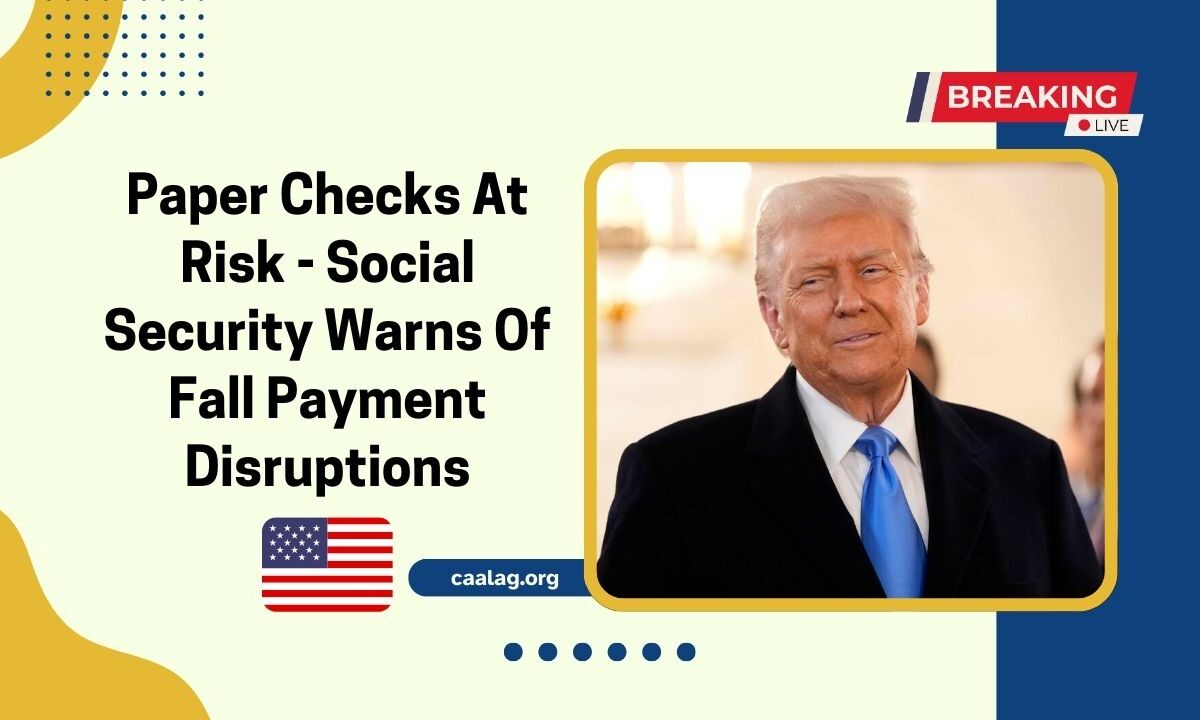The Social Security Administration (SSA) has issued a crucial warning: paper check recipients risk disruption of their benefit payments this fall.
Amid efforts to eliminate paper disbursements by September 30, 2025, over 500,000 beneficiaries must switch to direct deposit or Direct Express, or apply for a waiver. Those who don’t may face delays—even if they request a waiver on time.
Why the Change?
- Executive Order (Mar 2025): Mandates all federal payments go electronic by end of September.
- Cost & Security: Printing and mailing paper checks costs hundreds of millions annually and are 16× more likely to be lost, stolen, or altered.
- Modernisation Goal: Digital payments are faster, cheaper, and more secure for beneficiaries and the government.
Who Is Affected?
| Group | Estimated Recipients | Characteristics |
|---|---|---|
| Paper check users | ~521,644 | Mostly elderly, rural, unbanked, or with disabilities |
| Direct deposit users | ~99% of beneficiaries | Already upgraded—majority unaffected by change |
| Waiver seekers | Varies | Must contact Treasury to continue getting paper checks |
| Vulnerable communities impacted | Many tribal/rural areas | Face access barriers to banking & internet services |
Requirements & Timeline
- Deadline: September 30, 2025
- After Deadline: SSA may delay or hold payments until beneficiaries switch or get waivers—even if waivers are pending.
- Waiver Process: Paper check users must contact the Treasury Department and request waivers. No proactive waivers issued by SSA.
- SSA Outreach: Direct letters to paper recipients; field offices no longer maintain lists of local banks.
What You Must Do
- Switch to Direct Deposit:
- Simple via my Social Security account, phone (1‑800‑772‑1213), or in‑person with voided check or bank letter.
- Use Direct Express Prepaid Card:
- Treasury-issued debit card for unbanked recipients—no application fee.
- Request a Waiver:
- Call Treasury’s Electronic Payment Solutions at 1-800‑333‑1795 or complete waiver form.
Risks for the Vulnerable
- Unbanked adults (6% of US): Especially low-income, minorities, and disabled individuals
- Rural & Tribal Communities: Limited banking and internet infrastructure
- Elderly & Cognitively Impaired: Difficulty managing switch without support
- Reduced SSA Staffing: Cuts in workforce may hamper assistance, causing confusion and delays
What SSA Said
SSA emphasizes assistance and outreach: they’re working to help all beneficiaries move to electronic payments, and mailing letters to current paper check recipients. However, field offices no longer hold local bank listings, and staff cuts may slow response times.
Alternatives to Paper Checks
- Direct Deposit: Fastest, most secure—funds go directly to bank account
- Direct Express Card: Prepaid debit option with no bank account needed, though user fees and customer service issues have been reported
- Waivers: For those truly unable to access digital means—must be requested via Treasury, not automatic
Timeline at a Glance
| Milestone | Date |
|---|---|
| Executive Order Issued | March 25, 2025 |
| SSA Begins Paper-to-Digital Push | Spring 2025 |
| Waiver Applications Must Be Submitted | By Sept 30, 2025 |
| Deadline for Electronic Payments | Sept 30, 2025 |
| Payment Delays May Begin | October 2025 |
The shift away from paper checks is a long-time effort—but with just a few months left, the clock is ticking. SSA beneficiaries on paper need to act now to switch to direct deposit or Direct Express, or successfully apply for a waiver.
Failing to do so may lead to delayed or missed payments in October. For many, making this transition is the only way to maintain uninterrupted access to vital benefits.
FAQs
Will my benefits be stopped if I don’t switch by September 30?
Payments may be delayed or held until you switch or receive a waiver—even if your waiver is in progress.
How do I apply for a waiver to keep receiving paper checks?
Contact the Treasury Department directly at 1-800‑333‑1795 or submit a waiver form—SSA cannot approve waivers.
What if I don’t have a bank account?
You can sign up for a Direct Express prepaid debit card, which allows electronic delivery of benefits without a bank account.
